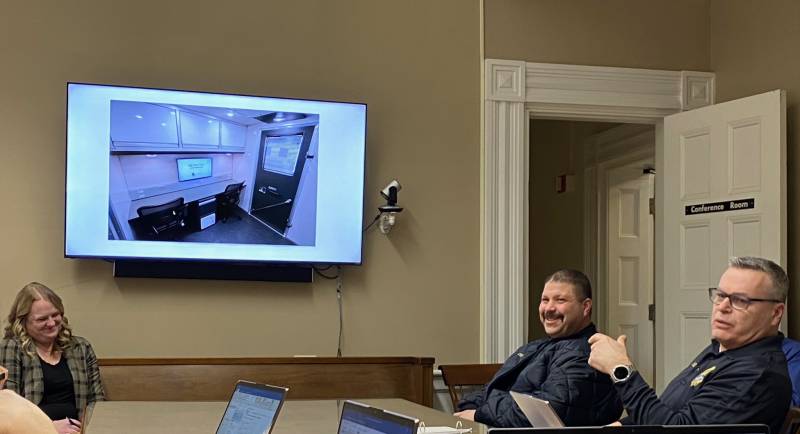
Photo by Joanne Beck
It was a good run — squeezing out every ounce of use from a mobile command vehicle the last 20 years — and it’s now time to make another considerable purchase to upgrade Genesee County Emergency Management’s ability for on-the-go operations, Coordinator Tim Yaeger says.
He gave a presentation Tuesday to the Public Service Committee about the current vehicle’s status, purchased for $157,000 nearly two decades ago, along with how much for a new one, with more interior space to accommodate more than twice the people, communication equipment, three work stations, single telescoping with two mast-mounted cameras, internet, a bathroom, kitchen area with amenities, and on-board gas generator.
Ticket price? About $724,000.
“This thing has been added on and morphed over the last 10 years, and probably at most, we've updated some of the equipment in there. But its capacity to maintain and keep stuff where it needs to be, it just doesn't have the capacity. So it's just starting to age, mechanically, or visually, inside it just looks unkempt, but it still functions. But we struggle with it,” Yaeger said. “I’m leaning towards a year to a year and a half to take possession of another vehicle.”
While there initially seemed to be adequate space inside, there isn’t enough internal working space — fitting about four law enforcement people in the command area — for command staff and officials, he said, especially after COVID brought about a general sense of people not wanting “to be on top of each other” when working indoors.
By the time a new vehicle is purchased and delivered, this one would be at least 20 years old, having been used an average of 14 times a year for everything from a plane crash to events at Darien Lake. The propane tank needs to be replaced, and the front tires, brake lines, leveling system and generators are all a concern at this point, Yaeger said.
He recommended a manufacturer that makes the Snap-on Tool trucks, and a customized vehicle would have upgrades of two cameras for viewing from more than just the front as is the case now; seating for 10; a large command center area; an on-board bathroom, which isn’t always important for urban units but is for rural Genesee County, he said; and it can be retrofit for future needs and is a “50 percent improvement from what we’re using.”
Yaeger said he’s “guessing around a $50,000 value” for the current vehicle and that, after scouting for a new mobile unit the last few years, the package would include a $27,000 discount and delivery. He will be getting Homeland Security funds to replace radio equipment.
"I'm using all my security money. So the 800 megahertz radios are all going to be replaced with new ones, and we are going to have a couple of remote heads. So in the command area, there's a capability for you to be in the Command Area and hear what's going on, obviously, and talk, but most of the radio equipment's going to be in the back. That's all going to be new," he said. "We are going to reuse some of the UHF and VHF equipment because we can add that to the current vehicle, and it's not that old. But that's all that's allowable under Homeland Security, and I can afford it with the Homeland Security funding. We have to replace the equipment. But other than that, there's nothing to purchase.
“I fear the longer we wait, it’s not going to get less expensive,” he said. “Right now, it would be a capital project.”
He joked that on the plus side, County Manager Matt Landers spotted that it came with a Keurig coffee maker. Landers said that he had anticipated this expense in the 2024 budget with an assets allocation of $675,000. The remaining cost would come from a sales tax reserve.
“So anywhere between $20,000 and $50,000 is the additional amount that we're going to have to pull from a 1% sales tax reserve,” Landers said. “And we'll accomplish that through a budget resolution that we will bring forward to the public service (committee) next month, and then the full funds will be available in the budget, then Tim can go out and procure that vehicle.
“Tim, 19 years ago, made the determination that this was something that was needed in the community. It is a significant cost, which is something that I'm mindful of. However, it does act in some ways, as I said, as an insurance policy,” Landers said. “You don't know how important it is until there's a crisis or something's happening, in which case you're going to need it. So we'll be glad to have it on hand in the event of that crisis. And it's just unfortunate that it costs so much money.”
